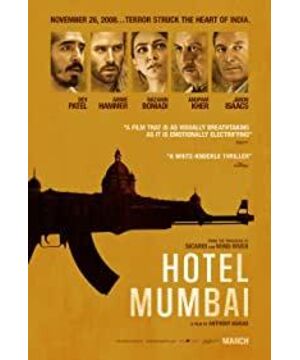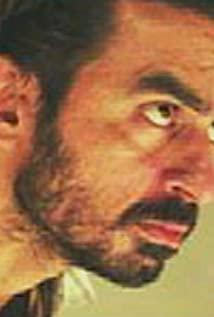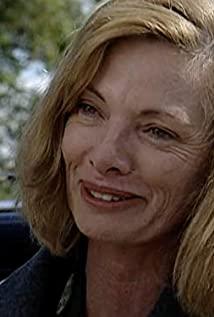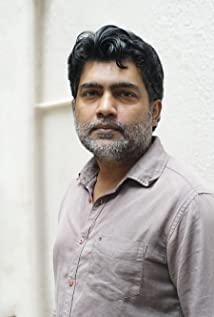The sudden sound of gunfire broke the bustling life of Mumbai, the horrified crowd, the excited thugs, and the busy and crowded city became a natural killing field. Following the fleeing crowd, criminals with guns easily entered the bustling hotel. The gun was in the backpack, in the toilet, in the lobby of the hotel, blatantly assembled and shot openly. Anxiety exploded in the crowd in an instant, and death was imminent.
Some people ridiculed this film as an "Indian anti-tourism propaganda film", not because of how brutal the thugs are, but because the film reflects the weakness of India's military power. The SWAT was late, and the police were helpless. There is a stark contrast between the barren equipment in the hands of the police and the superb weapons in the hands of the thugs. The entire hotel was surrounded by water, but no rescue force dared to break in. There are two worlds inside and outside the room. The instructions of the superiors are vague and uncertain, and the action or not basically depends on their own beliefs.
The various plots in the movie all reflect the backwardness of Indian society in rescue. In addition to the backwardness of the armed forces, the media people do not have basic awareness of prevention and also put the hostages trapped in the hotel into danger. The customers trapped in the hotel called the outside media for help. Unexpectedly, the media did not call the police first, but exposed their hiding location on the TV first. This insecure social environment compels the people at the bottom of India like Arjun to master the ability to save themselves as much as possible.
As the protagonist of the film, Arjun is an ordinary working person among the poor in India, with a family, relatives, and a job. Arjun, who has shown better than ordinary people's work ability from the beginning, led many hotel guests to escape from the guns of thugs with his knowledge of the hotel and excellent communication skills. So does such an achievement make him a hero? Traditional heroes always have the help of gods and are supreme beings. They have a certain social status, top equipment and skills. They are lucky, kind, and can burst out amazing energy at the crunch time. They walk with justice. Evil struggle. In contrast, Arjun seems ordinary, ordinary, just doing his best to lead the guests to escape around the hotel with experience and faith. He didn't shoot the enemy with a submachine gun in the shining light, he didn't come up with unrealistic tricks to outwit the gangsters, he only dodges carefully, and saves himself and others by hiding. Under the mob fire, there is no difference between the hero and the crowd.
David in the United States and Basil in Russia are common hero images. David runs around the hotel, trying to save his wife and children through his own plans. Vasily is a retired special forces soldier and has some experience in dealing with violent incidents. But in "Hotel Mumbai", those infinitely magnified and adored personal heroism will only hit the wall again and again in front of the real thugs in the movie, and the real indiscriminate killing will completely shatter the aura of the stupid protagonist. Except for the heroine Zahra.
Zahra, who is an Indian and a believer of Islam, oscillates between American culture and Indian religious culture throughout the film. She knew that these thugs came from the same hometown and believed in the same religion, but she was reluctant to admit it. She had been or wished to become an American spiritually, fleeing this uneasy city and notorious beliefs. When confronted by terrified old white ladies, she was vague; when pressed by thugs, she would not even speak a word of Hindi. It was not until the death of her lover, David, that she had only corpses by her side, and she began to pray and face the thugs. She was also facing the poor society, the miserable life, and the daunting religion. In the end, the hostess and Imran looked at each other, forcing herself and Imran to examine her heart and her beliefs. Zahra is just an ordinary believer in Islam, but her extreme religious behavior prevents her from mentioning her beliefs to outsiders, and she cannot even face her own beliefs. Years have passed, and a man of obvious faith cannot find solace in his faith. She raised her head to the muzzle of the gun and looked at Imran, she was torturing him, is this his religion?
The thug Imran, who was injured in the leg, is the most characterful of the thugs. Injured, he called his family, questioned whether Big Brother Bull had given his family money, and couldn't bear to kill the heroine when she was repenting. Contradictions in his character and behavior, reality, and beliefs are aroused one by one in this series of events. Being a thug who kills without blinking an eye is his characteristic of an extreme Muslim, and he is not innocent as a murderer in this horrific killing. Confession and concern for his family are the last trace of reason he has left in the secular world. As a teenager who has not yet fully established a worldview, he grew up in a poor Muslim family. Faith is the spiritual pillar of their life, and money is their life. down the material pillar. In the face of praying Muslim believers, he questioned the order of Big Bull for the first time. He did not have a strong sense of class, and his motive for killing was only aimed at infidels. Therefore, when he found out that the female lead was a Muslim, in his cognition, the female lead was his kind. Compared with the numbness and madness of other thugs, Imran's worldview is constantly being refreshed and established. He is the product of the ideological persecution of underage believers by extremist religious organizations.
Most of the staff in this hotel are the bottom people in Indian society, but when danger comes, many people burst out with a rare sense of mission. No moral kidnapping, no stakes, a group of ordinary people living in shabby houses willing to stay in a dangerous hotel to serve customers. Where did this belief come from? In the movie, Chef Oberon made such a speech before stopping the staff from rescuing customers: "No one will blame you for leaving, you also have your own life, and your family needs to be guarded; for those who stay, we are grateful." Maybe it’s a professional belief, maybe it’s an emotion of companionship, maybe it’s just an instinct to protect life, but it is such a faint starlight that gave the victims who experienced this incident, gave This hotel even gave the race a little hope. These little stars are all ordinary people and national heroes.
View more about Hotel Mumbai reviews











